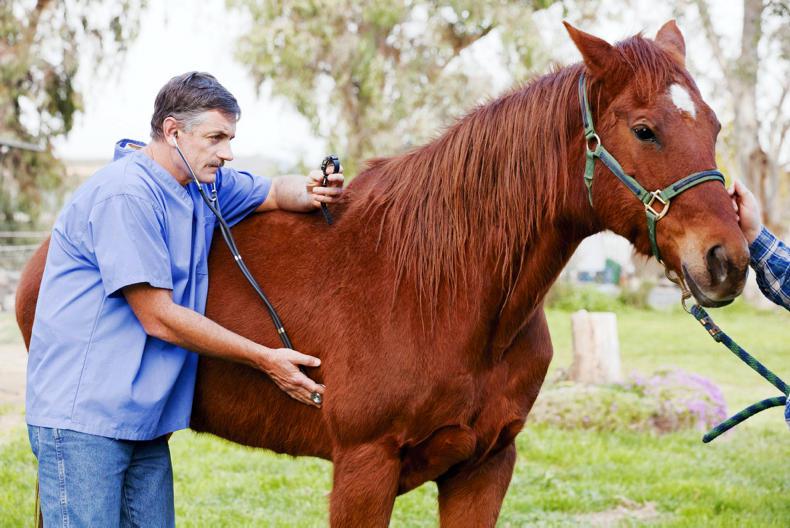LIKE many kids, when I was young I read all of the James Herriot books and dreamed of becoming a vet one day.
Above all, I loved to ride and look after horses and hoped that one day I might become an equine veterinarian.
While vet school taught me to diagnose and treat animals, it has taken me years to learn the business and regulatory side of things. From health and safety statements and VAT returns to insurance and medicines regulations, more and more I find my time is taken up with bureaucracy and not with treating horses.
In 2009, new EU medicine regulations came into force. Designed to protect the food chain, all horses now had to have passports and be microchipped. Medicine logs had to be kept.
While the EU wanted to ban the use of several commonly used drugs like phenylbutazone and acepromazine, Irish MEPs fought to retain the use of these medicines in horses, but in exchange for their availability it was agreed that any horse that received these medicines must be permanently kept out of the food chain.
I remember at the time reading these new regulations and being concerned that if horse owners were not properly educated as to the purpose of them, vets would be perceived as lacking empathy if before treating any horse, even a new born foal, the passport would have to be checked or markings taken before one could proceed.
HORSE MEAT SCANDAL
For years the new EU medicine regulations were loosely enforced until the horse meat scandal came along and it was found that horses were getting into meat factories with passports that might not even belong to them. Horses that were supposed to have been slaughtered in Ireland were turning up alive in the UK.
Since this time, almost like a knee-jerk reaction, the Department of Agriculture’s Special Investigation Unit (SIU) has carried out on-the-spot inspections of equine veterinarians and racing and stud premises. Any discrepancies in prescription, labelling, cascade use or passport endorsement has led to numerous charges being brought and Veterinary Council ‘fitness to practice’ procedures being taken.
This has cost vets, horse owners and taxpayers hundreds of thousands of euros in legal fees and loss of earnings for days spent in court, and to what end?
In 2016, I attended the British Equine Veterinary Association’s annual conference.
As chair of the equine committee of Veterinary Ireland, I attended their president’s meeting.
One of the main subjects of discussion was the difficulty that vets face in trying to understand and comply with the EU medicine regulations.
In many countries they are still working to introduce more passports and microchips for horses. It made me realise how far ahead we are in Ireland. However, in no other country were they enforcing the medicine regulations by criminalising the vets, but instead the Departments of Agriculture seem to be working with them to steadily improve levels of compliance and understanding.
While I may be a part of a veterinary committee, I write this piece as an individual and as a sole equine practitioner.
Going forward I feel the only solution to the problems we face with these regulations is for the Department of Agriculture to work with vets, not against them.
EDUCATION
The Department must provide appropriate education to both vets and horse owners, so that vets know how to carry out their business and that they don’t have to act as police and enforcers of legislation that their clients don’t understand or appreciate.
As a horse-owning nation, we need to decide whether we are producing equine athletes or a product to go into the food chain.
One might say that it is hard to do both at the one time.
Many vets feel that breeders should decide, when they are registering their foals, whether or not they want them to enter the food chain. If they do then they should have to keep medicine registers in the same way that those raising cattle do.
In other jurisdictions, horse owners registering their animals to race or compete pay a levy that is used to retrain or humanely dispose of horses when they are finished their athletic careers.
I will conclude by reminding readers that veterinarians are trying to do the best job they can, despite long hours, sleepless nights and never being able to get anywhere on time.
We are operating under more regulation, required levels of insurance and paperwork than many other professions, often on our own and without staff.
In the equine industry in Ireland, vets play a crucial and integral role. To ensure that this industry continues to be more and more successful, veterinarians need to be supported by both the Government and the horse-owning public.
Rosalinda Devereux MRCVS is based in Broadway, Co Wexford
The Department of Agriculture was invited to respond to the above article and issued the following statement:
The Department of Agriculture, Food and the Marine;
• Regulates in the area of animal medicines for the good of society generally, individual sectors and the broad agri-industry as a whole - ensuring that Ireland is acknowledged as a producer of premium animals and products.
• Recognises that the regulations relating to animal remedies are relatively complex in certain respects and less so in others and that veterinary practitioners play a crucial role in advising their clients in respect of medicines that they prescribe for the animals.
• Acknowledges that the vast majority of veterinary practitioners operate in compliance with legislative requirement and that in respect of only a very small number, has the Department had occasion to submit files for prosecution or by way of complaint to the Veterinary Council.
• Confirms that It has engaged significantly with the veterinary profession and farmers/horse owners over recent times – by way of seminars and printed material – in efforts to clarify legislative requirements.
• Confirms that a substantial amount of advice is freely available of the Department’s website
• Confirms that its Animal Remedies Section is always available to advise/clarify matters to anyone who makes such request.


 This is a subscriber-only article
This is a subscriber-only article
 It looks like you're browsing in private mode
It looks like you're browsing in private mode











SHARING OPTIONS: